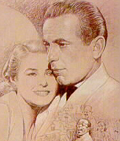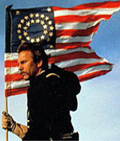|
Study Guide -
Good Luck, and Good Night (2005)
Director : George Clooney
|
Stars :
David Strathairn .... Edward R. Murrow
Robert Downey Jr. .... Joe Wershba
Patricia Clarkson .... Shirley Wershba
Ray Wise .... Don Hollenbeck
Frank Langella .... William Paley
Jeff Daniels .... Sig Mickelson
George Clooney .... Fred Friendly
Joseph McCarthy .... Himself (archive footage)
|

|
Preparation :
Read the Ebert, "Bad History" and The National Review reviews.
Historical/Social Significance :
His real intention appears to be to deliver a blow to the patella of a conglomerate-controlled press corps that, until recently, has indulged the Bush Administration’s most extravagant smears and lies. He has completely succeeded. David Denby The New Yorker
Today's climate of escalating paranoia isn't that different from what this country endured in the 1950s, when the birth pains of the Cold War evacuated a placenta named Joseph McCarthy. And while the 2000s have not yet generated a demagogue of McCarthy's stature, the sense of déjà vu is inescapable. Replace the "Communism" of the '50s with "Terrorism" today, and the parallels come into focus. (Note: this should not be interpreted as an argument that terrorism is not a serious threat, but an indication that there are those who exploit it as a means of financial and political gain.) James Berardinelli
George Clooney's new movie about Edward R. Murrow's devastating attacks on Sen. Joseph McCarthy, Good Night, and Good Luck, gets everything right but the truth. He has the chain-smoking, the unconscious sexism, the stiffly gelled hair of the time all perfectly rendered--right down to filming it all in atmospheric black-and-white. Yet, for the purpose of rendering Murrow as a lone hero who slew the Republican dragon, Clooney omits the entire Cold War (and the hot one in Korea). The National Review
Synopsis :
Edward R. Murrow decides to use his news show to take on Senator Joseph McCarthy.
Guided Questions for Viewing :
Assessment questions will be based on the following :
-
Why did people feel that Senator McCarthy was doing such a bad thing when he was just trying to remove Communists from the Army and the government?
-
Did you feel the use of real clips of Senator MCarthy made the movie more effective? Use particular scenes from the movie in your argument.
-
Mr. Nilan feels that one of the most effective components of this movie is that its tone was restrained. It lets the characters do the talking for themselves. Discuss why the people from The National Review (see review) and the person who wrote the "Bad History" Review would not agree with this.
-
Many people have said that this movie is as much about the war on terror in the US today as it is about McCarthyism in the 1950's. Discuss how the movie could be about both these issues.
-
Now that you have seen Good Luck, and Good Night comment on the similiarities with The Crucible. Be sure to make reference to specific scenes in the movies in your answer.
-
"So, although it is true that the Communist threat had existed earlier, prior to 1950, McCarthy's demagoguery succeeded only in damaging the anticommunist cause to such an extent that Christopher Andrew considers McCarthy as the greatest agent of influence the Kremlin had during the Cold War.1
Comment on this statement with reference to the film."
-
What do you think Murrow meant when he quotes Shakespeare, "The fault, dear Brutus, is not in the stars but in ourselves."
-
Who was Milo Radulovich? Why did Murrow think his story was important for them to cover?
-
Who was Don Hollenback? What does his story have to say about this time period in history?
|



